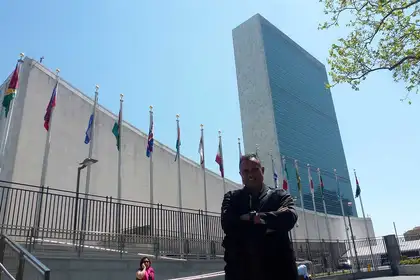
Professor Rawiri Taonui at the United Nations headquarters in New York.
Professor Rawiri Taonui, from Massey University’s College of Humanities and Social Sciences, has pushed for more indigenous representation at all levels of the UN when he presented at the 16th Session of the UN Permanent Forum on Indigenous Issues in New York.
Professor Taonui gave four papers to the forum, which was attended by more than 1000 delegates from States and Indigenous Peoples from around the world.
The papers focused on the 10th Anniversary of the signing of the UN Declaration on the Rights of Indigenous Issues (UNDRIP 2007) along with the UN 2030 Agenda for Sustainable Development – which aims to achieve development equality for indigenous people within the challenge of how states recognise indigenous aspirations for self-determination.
Professor Taonui also presented on the need for the UN to recruit more indigenous peoples into the organisation at all levels, on concerns about the increasing number of killings of indigenous human rights defenders, and on a proposal for indigenous institution representatives to be allowed as observers in the UN General Assembly and other UN bodies.
He said it was an honour to contribute to the debates on the challenges that lie ahead, including on how Western development projects engage with the principle of ‘free prior and informed consent’ before using indigenous lands and natural resources.
While economic development can have many benefits, Professor Taonui says consultation needs to be thorough and the benefits equally shared. “There are many disturbing stories about projects that have gone wrong from around the developing world, one disturbing trend of which is a steady increase in conflict between indigenous peoples and companies.”
He said it is a sad fact that the murder of indigenous leaders in countries such as Brazil has doubled over the last ten years.
Professor Taonui has been invited to sit as a member of a human rights tribunal in New York next year to investigate historical reports about the deaths of indigenous peoples in central America.
He also attended an Official Celebration of the 10th Anniversary on behalf of the Massey University coordinated Global Centre for Indigenous Leadership. He said the proposal for establishing the Centre was very well received by indigenous delegates.